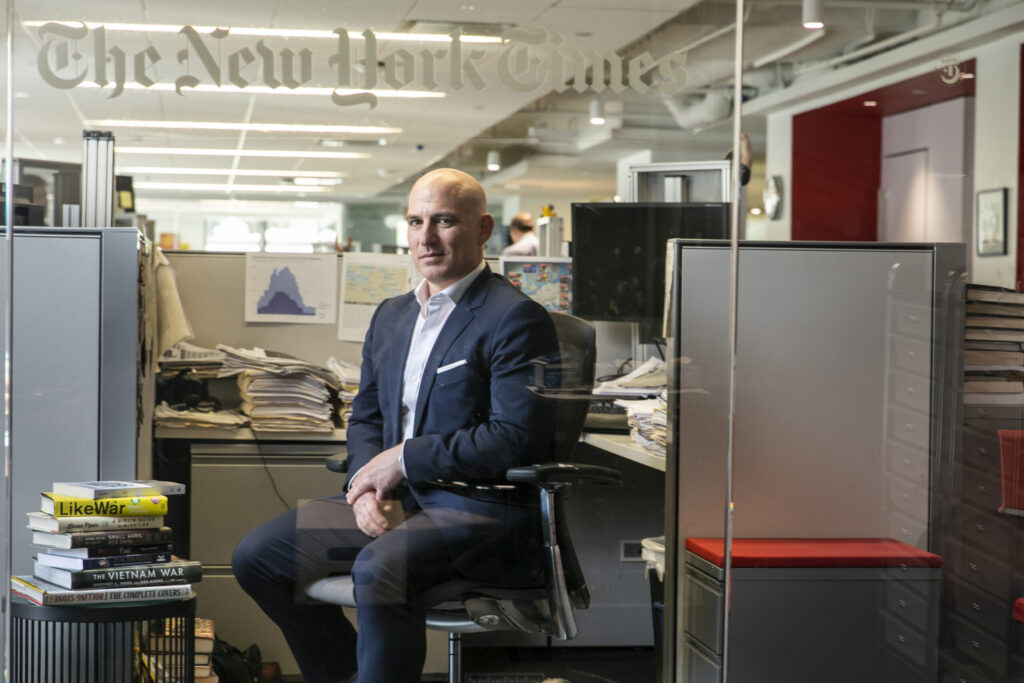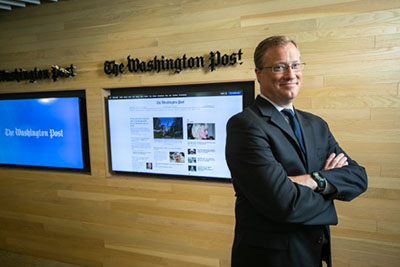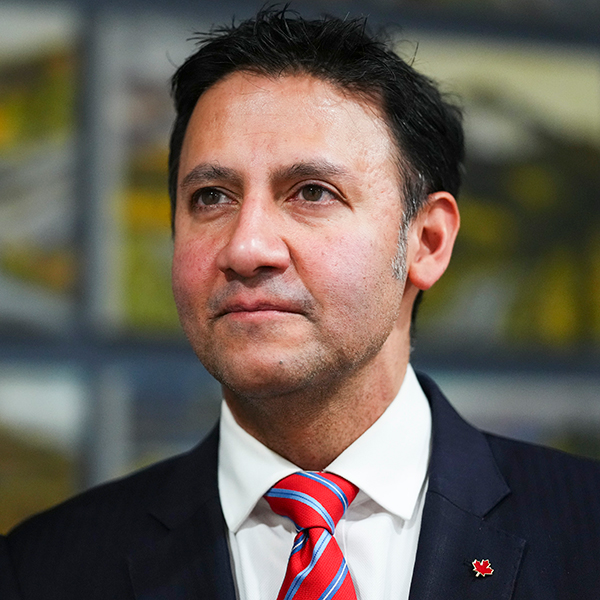As crazy and chaotic as it looks to the outside world, there is nowhere a journalist would rather be right now than Donald Trump’s Washington. Yes, you are regularly branded as “fake news” and labelled “the enemy of the people” by the scandal-prone tycoon who unexpectedly assumed the role of leader of the free world in 2016 and has proceeded to astonish political observers with his impulsive tweets and abrasive tirades.
But in exchange for all the abuse and heckling that has become a routine part of the 24/7 job spent monitoring a deliberately volatile Chief Executive, reporters get to chase down extraordinary stories at an incomparable moment in American history.
For The New York Times’ Matthew Rosenberg, BA’96, one of a surprisingly large number of McGill graduates reporting on the intricacies of the Trump presidency, the daily trade-offs are easily worth it.

“I’ve covered the war in Iraq, the war in Afghanistan, I’ve been all over Africa and was in India for five years. I’ve had a lot of real cool moments in my career. But I feel I can’t top this. I’ve never covered anything as intense, and intense over such a long stretch. And it’s fun – you’re out there every day trying to figure out what’s going on in a country that’s really in the middle of something, and you’re trying to decipher it, and explain to the world that this is what’s happening. It’s a rush, and there are great stories out there.”
One of the biggest stories so far, a story that never seems to end as the tenacious Washington journalists keep probing, is the investigation into Russian interference in the election that propelled Trump to power. Rosenberg, a national-security expert, was an integral part of the Times’ team that won a 2018 Pulitzer Prize for their exposure of Russian meddling – a prize they shared with The Washington Post, whose Pulitzer-winning team included his competitor on the national-security beat and McGill contemporary Devlin Barrett, BA’95.
The Pulitzer was a tribute to the importance of diligent reporting and fearless digging in the face of hostility toward the mainstream media – much of it generated by a beleaguered White House in constant attack mode. But it’s not the prospect of public recognition that drives reporters in the Trump era so much as the dogged determination to understand and explain the deep mysteries of Donald Trump as a candidate and a president.

“What motivates you,” says Barrett, who confirmed that Special Counsel Robert Mueller was investigating the U.S. president for obstruction of justice, “is, hey, here’s a riddle that I have to figure out and I’m not going to let it go, and I chip away at it until I’m done. To me, that’s fun.”Washington journalists, particularly those embroiled in the machinations of the Trump campaign and presidency, are a special tribe and their notion of what constitutes pleasure in a pressure-packed job may seem peculiar to the outside world.
Tim Mak, BA’09, who reports on national security for NPR and broke the story on accused Russian spy and gun lobbyist Maria Butina, started his journalistic career as a columnist for the McGill Tribune, recruited by the paper’s opinion editor Byron Tau, BA’08 – who is now a Department of Justice reporter for The Wall Street Journal (and still a close friend). Mak’s deeply sourced, data-driven reports may take weeks and months of preoccupied research, and in the high-stakes world of Washington politics, the stress, both external and internal, can feel unrelenting.
Errors not an option
“We live in an environment where every single mistake you make, you’ll be accused with the epithet of ‘fake news.’ What keeps you up at night is not the criticism per se but, ‘Did I get it right, did I double-check everything, did I protect my sources where I said I would?’”
Developing, evaluating and protecting sources are crucial components of the job during a presidency where public pronouncements seem even further removed from deeper, hidden truths than the Washington norm.
“The stakes are very high and the partisan passions are flaring,” says Rosenberg, “so you have to be very careful.” Government officials and political figures with access to secret information have never been more inclined to leak, and it’s the diligent reporter’s job to take advantage of this human instinct without completely giving into it.
“People talk because people in government care that stories are reported accurately, that the full story gets out,” says Barrett. “People say things on background that they can’t say on the record because they feel something important is being overlooked or misrepresented. But not everyone’s an honest broker.”Journalists chasing a Trump story have to be wary of being spun and perhaps even discredited by self-interested sources – up to and including vicious rivals within the Trump White House who for all their complaints about government leaks constantly use the press to settle scores with each other.
Under attack
In this charged political atmosphere, journalists also have to be ready to defend themselves against partisan threats and bullying. Mak learned how to weather abuse early in the presidential campaign when he found himself on the receiving end of a typically foul-mouthed rant by Trump’s then personal lawyer Michael Cohen.
Mak had the mental coolness to record the exchange – including such classic Cohenisms as “So I’m warning you, tread very [expletive] carefully, because what I’m going to do to you is going to be [expletive] disgusting” – and in his reply (“Michael, besides the warning, do you have a substantive comment that I can include…?”), he managed to remain remarkably calm and dispassionate.
“Some reporters might have responded to the threat angrily,” he says, “but maybe my Canadian politeness wouldn’t allow it.”
The negativity in the Trump milieu is inescapable, and yet despite it (and sometimes even because of it), Mak sees his work as a constant pleasure. “It’s vibrant – being a journalist in Washington involves covering a new story every day, meeting new people, meeting new actors, getting their opinions, understanding their point of view. There are costs but also immense benefits to this work – when you sift through huge amounts of information and find that diamond in the rough, of course you get a thrill.”
The thrill of discovery is the endpoint of the non-stop chase. But even the more mundane nature of daily reporting and TV updates has been transformed by the mercurial, unexpected zig-zags of this frantic presidency. “It’s grueling, it’s exhausting, it’s long hours,” says Global Television’s Ines de La Cuetara, BA’12 – who on a rare day off still found herself transfixed by Supreme Court justice Brett Kavanaugh’s Congressional confirmation hearing.

“There are two of us in the DC bureau for Global and we’re filing pretty much every day,” says de La Cuetara. “It didn’t used to be like this, but now there are constant moving parts, there’s always a new tweet, it’s all everyone’s talking about. So it’s the best place to be right now in news – it feels like you’re witnessing a part of history.”
Because she spent 18 months crisscrossing America on the presidential campaign for ABC, living out of a suitcase in an endless succession of unpredictable 18-hour days, de La Cuetara is in the unlikely position of finding Trump’s Washington relatively stable and quiet. But that all can change with an impulsive presidential insult of Justin Trudeau that suddenly needs to be parsed in hourly reports for its potentially drastic consequences.
“The story in retrospect is not just about a bombastic Trump tweet or how he handles personal relationships – it had real implications for NAFTA renegotiations. We have to keep an eye on how all this impacts Canadians down the line.”
Washington journalists, sometimes to their cost, have learned that the public’s capacity for Trump news is limitless.
“I had a funny moment in 2017,” says Barrett, remembering the deep dive he was taking into the rumours of Russian interference at the time. “I was in the thick of it, I wasn’t thinking very well, every day was a series of tense conversations and my wife made me go for a physical – she thought I was going to break down, just exhaust myself. I was in the doctor’s office in one of those paper [gowns] and the doctor says, why are you here? I said, well, work’s a little stressful. She says, what do you do? I say, I cover the FBI. And she immediately goes into a series of questions about what do I think the investigation is going to find, what do I think of all these individuals, and I’m politely nodding along thinking, this is great – is this monitor on, are you tracking what’s happening in my body right now?”
A pressure cooker
The concept of work/life balance doesn’t have a lot of resonance in Washington, particularly among journalists who feel energized by the very work that exhausts them. To escape the craziness, Barrett, at his son’s instigation, now clears his head and sheds journalistic moodiness by making father-and-son trips to the gym every morning – “My personal trainer is a nine-year-old,” he laughs.
De La Cuetara does yoga, visits museums, goes horseback riding, seeks out friends who are not reporters and studies Mandarin (“You have to turn your phone off and pay full attention, so that’s almost like meditation”).
Besides turning off his phone in the evening, as all Washington journalists with an interest in self-preservation claim to do, Tau took a fellowship to Japan and researched a much-admired article about Japanese baseball culture – “probably the most fun piece I ever got to write,” he says.
He also renewed an interest in chess, a distraction he had developed in the McGill Tribune offices – “although I took up chess on my cellphone,” he says, “so I don’t know if I actually curbed my phone addiction.” Rosenberg likes to go camping with his children in (seemingly) remote Appalachia, where he still can’t help assessing the inequalities of America through his journalistic lens. “Trump is, if anything, a symptom of the deeper problems we have [in this country]. He is not the creator of them.”
Targeting the press
There’s no doubt, though, that Trump has leveraged the latent hostility felt by his supporters against the media and created a raucous climate of almost giddy animosity. “I’ve worked in places where journalists are treated like the enemy,” says Rosenberg, who had to leave both Afghanistan and Pakistan after being accused of being a spy. “It’s not pleasant and makes the job much harder and adds risks. Here, we’re not that hard to find. If someone wants to do us harm, they’re going to do that.”
That point was made frighteningly clear on October 24, when the New York offices of CNN were evacuated after a suspicious package was discovered in its mailroom. The package contained a pipe bomb. CNN (the vice president of news gathering in its Washington bureau is Adam Levine, BA’94), along with The New York Times and The Washington Post, are the news organizations most frequently accused of being “fake news” by President Trump.
Rosenberg himself was the subject of Trump’s scorn when he and his Times colleague Maggie Haberman reported on concerns among U.S. intelligence officials over the president’s habitual use of non-secure cellphones and how it made him vulnerable to foreign spies. Trump declared the report a “Fake Story” on Twitter.
Washington reporters generally feel more concerned with the inflammatory rhetoric of the president and his team than with the jeers hurled at them by Trump supporters. “Journalists currently have to grapple with public skepticism,” says Tau, “but the best thing we can do is to counter it with good work. When I go to Trump rallies and he points to the press, we get booed. But I never felt it was truly menacing or ominous. You talk to the same people who heckled you and they can be quite friendly.”
There’s some consolation in that kind of face-to-face encounter – the United States may not be quite as divided and polarized and angry as it can seem when compacted into a presidential tweet. And that ultimately gives the embattled Washington reporters more hope and confidence in the work they do.
“I do think it’s disturbing and worrisome,” says Barrett, “that part of the way to defend yourself as a public figure is to trash us. The best way to show that’s not true is through the work. Certainly in some quarters, there’s an effort to defeat the truth. I’m all in on the notion that truth is something that doesn’t die or get buried. It can be delayed or held up at the station. But if I thought the truth could be defeated, I wouldn’t do this job.”
John Allemang is a Toronto-based writer and a former feature writer with The Globe and Mail. His work has earned a National Magazine Award and a Digital Publishing Award, and has been shortlisted for National Newspaper Awards and a Canadian Online Publishing Award.


